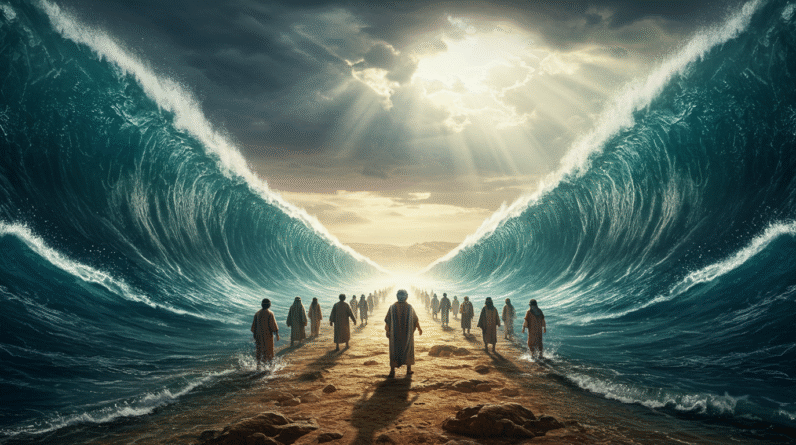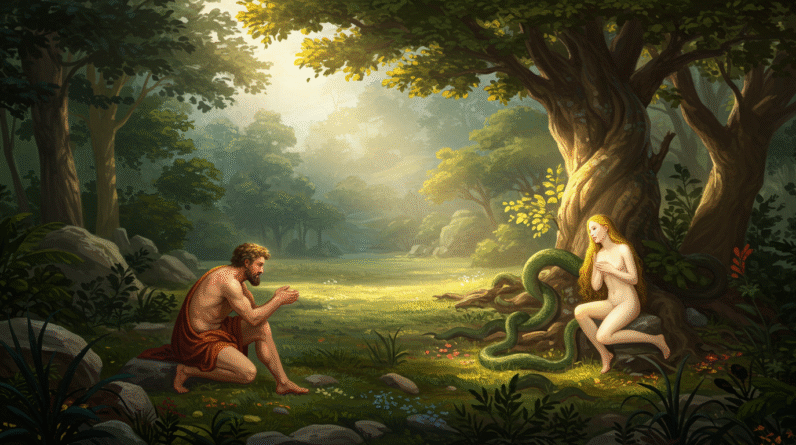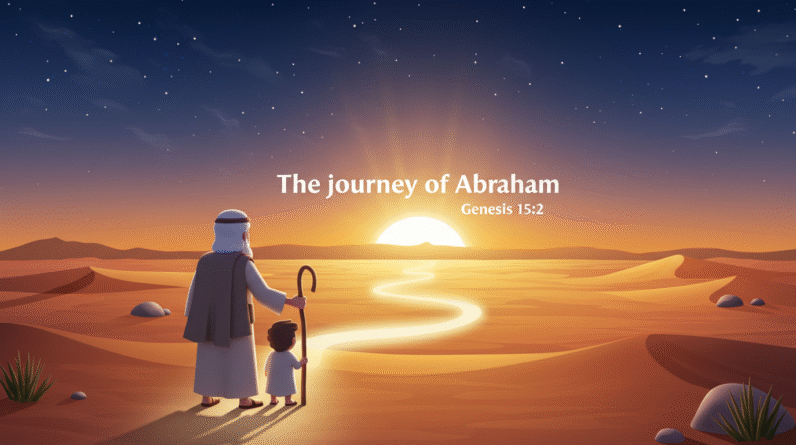Explore the profound journey of Adam in Genesis, from creation to consequence. Delve into themes of choice, accountability, and redemption in this timeless narrative.
Adam: The First Man – Genesis 1:26-31; Genesis 3:1-24

Introduction
Imagine you are at the dawn of creation. The universe is newly formed, with Earth not yet knowing the weight of time. In these pages of Genesis, we are introduced to Adam, the first man, a figure of immense significance and a cornerstone in the tapestry of biblical narrative. As humanity’s progenitor, Adam holds a unique place in the story of creation, a role both profound and profoundly human, reflecting the complex interplay between obedience, curiosity, and consequence. His life gives us insight into the dawn of human existence and the challenges woven into the fabric of free will.
Their Story in the Bible
In the fertile lands of the Garden of Eden, Adam’s story begins. According to Genesis 1:26-31, God created man in His image, marking humanity’s inception with divine significance. Adam is entrusted with the stewardship of all creation, granted dominion over the creatures of the earth. It’s a time of innocence and harmony, a period undisturbed by the shadows of disobedience that later unfold.
The narrative takes a pivotal turn in Genesis 3:1-24 with the introduction of the serpent’s cunning, which lures Eve into disobedience. Adam, standing by, also partakes of the forbidden fruit. This act sets in motion a cascade of consequences, altering the course of humanity. Their eyes opened, Adam and Eve grapple with shame and the newfound knowledge of good and evil, a poignant reminder of lost innocence. Cast out from Eden, Adam’s journey becomes a reflection on the nature of choice, consequence, and the enduring hope found amidst adversity and exile.
Lessons from Their Life
Adam’s life is a tapestry of lessons that resonate deeply even today. Firstly, his story teaches us the power of choice and the sometimes devastating impact of our decisions. The choice to eat the forbidden fruit serves as a vivid reminder of free will’s complexity and the weighty responsibility it carries, influencing not only ourselves but future generations, as seen in the fall’s ramifications.
Secondly, the narrative offers a profound lesson on accountability. In the face of disobedience, Adam’s initial reaction is to deflect blame—a response all too familiar in our own lives, urging us toward self-reflection and the courage to take responsibility. Lastly, Adam’s journey is interwoven with a theme of redemption and hope. Despite the severity of their actions, God’s continued presence illustrates that even in the depths of consequence, there is a divine promise and the opportunity for transformation.
Connection to Today’s World
Adam’s story, though ancient, touches the core of contemporary human experience. In a world marked by rapid change and boundless opportunities, the challenge of making choices grounded in wisdom and moral integrity is ever-present. Adam’s narrative reminds us that each decision we make resonates far beyond the immediate, shaping our relationships and our world. This calls for a careful weighing of our actions, mindful of their broader impact.
Furthermore, in an era rife with blame-shifting and evasion of responsibility, Adam’s story is a call to embrace honesty and accountability. Accepting mistakes doesn’t diminish our worth; instead, it fortifies our character and fosters growth. Ultimately, Adam’s tale offers reassurance that no matter the complexity of our pasts, there remains a pathway toward redemption, underscoring the enduring strength of hope and renewal in human life.
Key Bible Verse
“Then the Lord God made garments of skin for Adam and his wife and clothed them.” – Genesis 3:21
This verse encapsulates the dual themes of consequence and grace in Adam’s story. Even after their disobedience, God’s act of clothing Adam and Eve signifies mercy and provision amidst judgment, a poignant reminder of divine compassion.
Thought-Provoking Question
In moments of choice and consequence, how do you reflect on the balance between pursuing knowledge and maintaining obedience, as illustrated in Adam’s journey?
Historical/Cultural Context
In the ancient Near Eastern context, Adam’s narrative serves as a foundational myth, exploring early humanity’s understanding of existence, the human condition, and the spiritual themes that remain central to many cultures today. The portrayal of Adam as a caretaker of creation highlights humanity’s interconnectedness with nature—a relationship that is as relevant now as it was millennia ago.
Comparison with Other Characters
A comparison could be drawn with Jesus, often referred to as the “last Adam,” contrasting the disobedience of Adam with Christ’s redemptive obedience, illustrating themes of fall and restoration that are pivotal in Christian theology.
Prayer
Heavenly Father, as we reflect on the life of Adam, teach us to learn from his journey of choices and consequences. Guide us in our own lives, so that we may choose wisely, take responsibility for our actions, and find hope in Your enduring grace. Amen.







